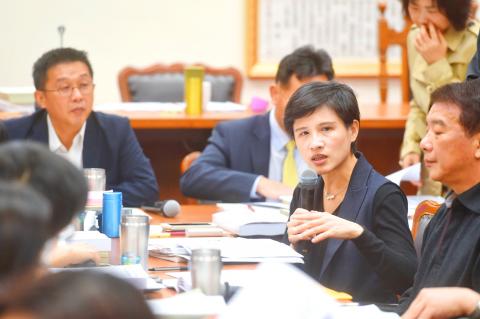Minister of Culture Cheng Li-chiun (鄭麗君) yesterday touted the ministry’s plans to develop ultra-broadband and “revisit historic scenes” as “very forward-looking” in her explanation of its request for NT$21.46 billion (US$711.6 million) in funds earmarked for the Cabinet’s Forward-looking Infrastructure Development Program.
The ministry has submitted subsidy requests of NT$5.66 billion and NT$15.8 billion respectively for its “revisiting historic scenes” and “digital infrastructure construction” projects, Cheng said at a meeting of the legislature’s Education and Culture Committee.
The projects would be carried out from this year to 2020, with some work set to continue until 2021, she said.

Photo: Fang Pin-chao, Taipei Times
“Revisiting historic scenes,” which was listed as an urban and rural construction project under the Cabinet’s plan, would maintain and reinvent historic sites.
It is to incorporate technology into historic sites’ introductions to provide visitors with a better understanding of their historical context, she said.
The project is the first in the nation’s history to incorporate the concept of “cultural governance,” which represents a major step forward, the minister said.
Cultural sites should be added through maintaining and revitalizing existing ones rather than building new ones, which would benefit urban and rural development, Cheng said, adding that future projects proposed by the ministry would be reviewed according to this principle.
The “digital infrastructure construction” project includes plans to develop ultra-broadband services, produce high-resolution television shows, and create TV programs and movies that focus on Taiwanese culture, she said.
The project is to include the establishment of a national cultural database, the creation of TV shows with 4K resolution and the development of over-the-top content — or content distributed online without subscribing to a traditional service — in response to the rise of new media, she said.
Underlining the importance of Taiwanese culture in the broadcasting and film industries, Cheng said that even if bandwidth is upgraded, it would only be “serving other nations’ cultures” if there are no programs that promote Taiwanese culture.

Alain Robert, known as the "French Spider-Man," praised Alex Honnold as exceptionally well-prepared after the US climber completed a free solo ascent of Taipei 101 yesterday. Robert said Honnold's ascent of the 508m-tall skyscraper in just more than one-and-a-half hours without using safety ropes or equipment was a remarkable achievement. "This is my life," he said in an interview conducted in French, adding that he liked the feeling of being "on the edge of danger." The 63-year-old Frenchman climbed Taipei 101 using ropes in December 2004, taking about four hours to reach the top. On a one-to-10 scale of difficulty, Robert said Taipei 101

Taiwanese and US defense groups are collaborating to introduce deployable, semi-autonomous manufacturing systems for drones and components in a boost to the nation’s supply chain resilience. Taiwan’s G-Tech Optroelectronics Corp subsidiary GTOC and the US’ Aerkomm Inc on Friday announced an agreement with fellow US-based Firestorm Lab to adopt the latter’s xCell, a technology featuring 3D printers fitted in 6.1m container units. The systems enable aerial platforms and parts to be produced in high volumes from dispersed nodes capable of rapid redeployment, to minimize the risk of enemy strikes and to meet field requirements, they said. Firestorm chief technology officer Ian Muceus said

MORE FALL: An investigation into one of Xi’s key cronies, part of a broader ‘anti-corruption’ drive, indicates that he might have a deep distrust in the military, an expert said China’s latest military purge underscores systemic risks in its shift from collective leadership to sole rule under Chinese President Xi Jinping (習近平), and could disrupt its chain of command and military capabilities, a national security official said yesterday. If decisionmaking within the Chinese Communist Party has become “irrational” under one-man rule, the Taiwan Strait and the regional situation must be approached with extreme caution, given unforeseen risks, they added. The anonymous official made the remarks as China’s Central Military Commission Vice Chairman Zhang Youxia (張又俠) and Joint Staff Department Chief of Staff Liu Zhenli (劉振立) were reportedly being investigated for suspected “serious

American climber Alex Honnold is to attempt a free climb of Taipei 101 today at 9am, with traffic closures around the skyscraper. To accommodate the climb attempt and filming, the Taipei Department of Transportation said traffic controls would be enforced around the Taipei 101 area. If weather conditions delay the climb, the restrictions would be pushed back to tomorrow. Traffic controls would be in place today from 7am to 11am around the Taipei 101 area, the department said. Songzhi Road would be fully closed in both directions between Songlian Road and Xinyi Road Sec 5, it said, adding that bidirectional traffic controls would